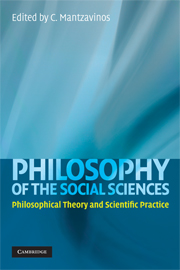Part III - How Philosophy and the Social Sciences Can Enrich Each Other: Three Examples
Published online by Cambridge University Press: 05 June 2012
Summary
Part III of the book deals with three quite diverse problems: the problem of cooperation in society; the problem of virtuous behavior; and the problem of the hermeneutic circle. The problems are carefully selected in order to address issues of fundamental importance for the philosophy of the social sciences, which are, however, very diverse in scope. The aim is to show that these problems can be most fruitfully addressed, and at least partly solved, if both philosophical and scientific resources are used. This volume takes an anti-foundationalist view: that is, it rejects the notion that philosophy can or should provide any kind of foundations for the social sciences; and it takes the stance that philosophy and the social sciences are equally important partners in the enterprise of solving problems. In this process the resources of both philosophy and the social sciences are mutually enriched and their boundaries are continually shifting. The three examples provided in this part thus show How Philosophy and the Social Sciences Can Enrich Each Other.
The so-called “Hobbesian problem of social order” is at the heart of political philosophy and the social sciences. How is it possible, given the self-interested nature of human beings, that a stable social order can emerge and prevail, and cooperation can take place? In centuries of discussion of the proposed solutions to this fundamental problem, different arguments have been advanced and different methods have been applied. James Woodward addresses the question, “Why do people cooperate as much as they do?” and uses the resources of game theory and experimental economics in trying to explain the degree of cooperative behavior shown by human agents.
- Type
- Chapter
- Information
- Philosophy of the Social SciencesPhilosophical Theory and Scientific Practice, pp. 215 - 218Publisher: Cambridge University PressPrint publication year: 2009



